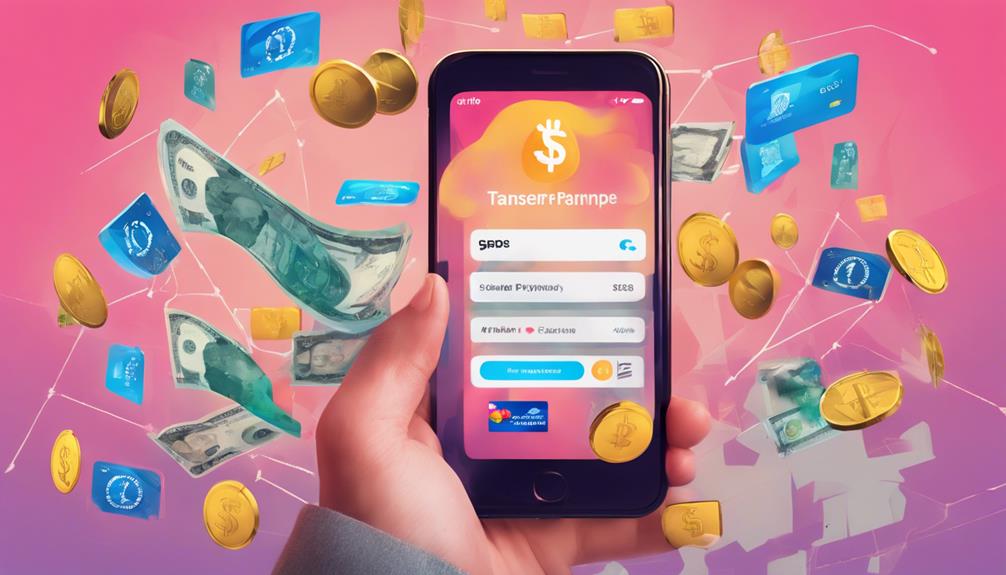When managing money abroad as an expat, try Wise, Revolut, XE Currency, or Instarem Money Transfer for easy international money transfers and currency exchange. These apps offer competitive rates and low fees for over 50 currencies, making managing finances in foreign countries hassle-free. Explore investment platforms like Etoro and Saxobank for diversification strategies and growing wealth while abroad. For quick access to funds in multiple currencies, consider offshore banking accounts like HSBC Expat. These tools and apps will help you navigate your financial needs as an expat.
Key Takeaways
- Use Wise, Revolut, or XE Currency for international money transfers and currency exchange.
- Explore investment platforms like Etoro and Vanguard for wealth-building opportunities.
- Consider offshore banking options for multi-currency accounts and cost-efficient transfers.
- Monitor finances with tools like Portfolio Visualizer and Kubera while living abroad.
- Optimize cash flow with treasury management solutions for international trade operations.
Currency Management Apps

When managing finances as an expat, utilizing currency management apps such as Wise can streamline international money transfers with low fees and transparent rates. These apps like Wise and Instarem Money Transfer cater to expats by offering competitive exchange rates and efficient transfer times for over 50 currencies.
They simplify currency conversion and facilitate global financial transactions, making managing finances in foreign countries hassle-free. Expats benefit from the convenience of these apps, which allow them to send money internationally with ease and confidence.
Investment Platforms for Expats

When considering investment platforms as an expat, focus on selecting platforms like Etoro, Saxobank, Vanguard, or BitPanda.
Utilize tools for monitoring your portfolio performance and growth, and implement diversification strategies for potentially maximizing returns.
These choices can help you build wealth and work towards your financial goals while living abroad.
Investment Platform Selection
Consider exploring investment platforms like Etoro, Saxobank, Vanguard, or BitPanda for a diverse range of investment opportunities as an expat. These platforms allow you to deposit cash easily through methods like debit card transactions or bank transfers. You can conveniently monitor your portfolio's performance and growth online. Start your investment journey with small amounts, gradually building a substantial portfolio over time. Opt for platforms that offer a wide range of investment options, including stocks, shares, ETFs, gold, or cryptocurrency.
| Platform | Diverse Investment Opportunities | Deposit Methods |
|---|---|---|
| Etoro | ✔️ | Debit Card, Bank Transfer |
| Saxobank | ✔️ | Debit Card, Bank Transfer |
| Vanguard | ✔️ | Bank Transfer |
| BitPanda | ✔️ | Debit Card, Bank Transfer |
These platforms cater to your investment needs as an expat, providing a variety of options to help you grow your investments wisely.
Portfolio Monitoring Tools
To effectively monitor your investment portfolio as an expat, explore portfolio monitoring tools like Interactive Brokers, Finchat, and Portfolio Visualizer.
Interactive Brokers, an international financial platform established in 1977, offers access to various markets and currencies globally.
Finchat, priced at $19.99 monthly, utilizes AI to provide straightforward answers to financial queries.
Portfolio Visualizer, a free tool, aids in comparing and analyzing investment portfolios with backtesting features.
Additionally, for managing your international finances, consider Wise, a money transfer service supporting 50+ currencies with fees starting at 0.43% per transfer, and Instarem Money Transfer, offering competitive rates starting at 0.25% per transaction.
Diversification Strategies
Explore investment platforms like Etoro, Saxobank, Vanguard, or BitPanda to diversify your investment portfolio as an expat. These platforms offer diverse investment opportunities, allowing you to access a wide range of options such as stocks, shares, ETFs, gold, or cryptocurrency.
By utilizing these investment platforms, you can easily deposit cash through debit cards or bank transfers, enabling you to start investing promptly. Monitoring your portfolio performance and growth is convenient with these online platforms, empowering you to make well-informed decisions regarding your investments.
Start with small amounts to gradually build a substantial portfolio over time, leveraging the tools and features provided by these platforms. Embrace diversification strategies to optimize your portfolio and enhance your overseas living experience as an expat, taking advantage of the diverse investment opportunities available through reputable investment platforms.
Online Money Management Tools

Check out the following points for a detailed comparison of online money management tools:
App Features Comparison,
Budget Tracking Solutions,
and Currency Exchange Tools.
These factors are essential for expats looking to efficiently manage their finances while living abroad. Some important financial tips for expats include researching local banking options to find the most suitable and cost-effective solution for managing their funds. Additionally, understanding the local tax laws and regulations can help expats avoid any unexpected financial burdens. It’s also recommended for expats to create a budget and plan for any potential currency fluctuations to ensure they can maintain their desired standard of living.
Understanding the features and benefits of each tool can help you make informed decisions about your money management strategy.
App Features Comparison
Compare the features of various online money management tools to determine the best fit for your financial needs as an expat.
Kubera stands out with its family net worth tracking capabilities across currencies and accounts for $6.67/month, offering a $100 referral discount.
Lunch Money simplifies expense tracking and budgeting at $10/month, integrating with banks across 17 countries and providing a 1-month free trial with an affiliate link.
Interactive Brokers, established in 1977, caters to customers from over 200 countries, granting access to products in 150+ markets and 27 currencies, making it a recommended choice for expats.
Finchat, starting at $19.99/month, uses AI for investment research, providing answers in plain English by leveraging 35 years of historical financial data.
Portfolio Visualizer offers a suite of free portfolio analysis tools, including a backtest asset allocation tool, ideal for comparing and analyzing investment products.
Each tool offers unique features catering to different aspects of your financial management as an expat.
Budget Tracking Solutions
When managing your finances as an expat, consider utilizing online money management tools like Kubera, Lunch Money, Interactive Brokers, Finchat, and Portfolio Visualizer to streamline your budget tracking process.
Kubera offers thorough net worth tracking across multiple currencies and accounts for just $6.67 per month.
Lunch Money simplifies expense tracking and budgeting with easy bank integrations across 17 countries for $10 per month.
Interactive Brokers, established in 1977, serves customers from over 200 countries with access to products in 150+ markets and 27 currencies, making it ideal for expats.
Finchat provides AI-powered investment research tools for $19.99 per month, leveraging data on global equities with 35 years of historical financials.
Portfolio Visualizer offers a free all-inclusive suite of portfolio analysis tools to compare and analyze portfolios, with a backtest asset allocation tool available.
These tools can help you effectively manage your budget, track expenses, analyze investments, and monitor your net worth across different currencies.
Currency Exchange Tools
Consider exploring online money management tools that specialize in currency exchange to efficiently handle your finances as an expat.
Managing money abroad can be simplified with these tools that offer various features to help you navigate foreign currency transactions.
Some notable options include Wise, which provides a broad network covering 50+ currencies with fees starting at 0.43% per transfer, and Revolut, a popular choice for holding and exchanging multiple currencies seamlessly.
XE Currency offers live exchange rates and historical charts, aiding in tracking fluctuations for informed financial decisions.
Additionally, Instarem Money Transfer boasts low and transparent fees starting at 0.25% per transfer, providing competitive exchange rates on select routes.
For a comprehensive approach, Currency Converter Plus is a useful app for expats to monitor fluctuations, calculate exchange rates, and effectively manage finances in a new currency.
Property Investment Expertise

Explore Callum Williamson's specialized expertise in property conversions and redevelopment, focusing on creating income through strategic property investments for long-term wealth growth.
Callum, with a focus on the UK market, excels in offering tailored property strategies aimed at generating income and building wealth over time. His knack for property conversions and redevelopment allows clients to maximize returns on their investments while mitigating risks.
Whether it's for pension planning or long-term financial security, Callum's guidance in property investments is backed by thorough research and a proven track record of success.
Serving clients across Asia, Europe, and the Middle East, Callum provides personalized advice that's both insightful and practical. By leveraging his in-depth understanding of the property market and his commitment to client satisfaction, Callum Williamson stands out as a trusted resource for those seeking to make informed and profitable property investment decisions.
Cross-Border Payment Systems

Efficient cross-border payment systems streamline international money transfers for expatriates, offering them cost-efficient and swift transfer options. These systems are designed to make sending money across borders easier and more affordable for individuals living and working away from their home countries.
Here are some key points to keep in mind:
- Cost-Efficient Transfers: Cross-border payment systems often provide expats with lower transaction fees compared to traditional banking methods, saving them money on each transfer.
- Reduced Processing Times: By utilizing these systems, expatriates can benefit from quicker processing times, ensuring that their funds reach their intended destination promptly.
- Enhanced Financial Inclusion: Innovative solutions within cross-border payment systems are expanding financial access for expats worldwide, promoting greater financial inclusion.
- Trade Finance Efficiency: These systems play a crucial role in simplifying trade finance operations for businesses engaged in international trade, streamlining transactions and improving overall efficiency.
Treasury Management Solutions

Treasury management solutions play an important role in helping businesses effectively oversee their cash flow, liquidity, and financial risks. These tools are vital for managing money abroad, providing SMEs with the necessary resources to optimize their treasury operations. By utilizing treasury management apps and services, businesses can enhance their financial performance, reduce costs, and improve efficiency. These solutions often encompass cash management, risk management, and investment management services, offering real-time visibility into financial data and automating transactions to streamline processes. Collaborating with treasury management providers can further assist SMEs in accessing specialized expertise tailored to their unique needs.
| Benefits of Treasury Management Solutions |
|---|
| Enhances financial performance |
| Improves cash flow management |
| Reduces costs |
| Provides real-time financial visibility |
| Automates transactions |
International Investment Banking Jobs

International investment banking jobs offer exciting opportunities for individuals seeking a career that involves travel and global networking. Working for renowned investment banks like J.P. Morgan, Goldman Sachs, and Barclays can provide you with a chance to immerse yourself in diverse financial markets, interact with a wide range of clients, and engage in complex deals on a global scale.
These roles often come with high-pressure situations, long hours, and extensive travel requirements. However, the global opportunities presented in international investment banking can lead to a rewarding career as you expand your professional network and gain valuable experience in different markets worldwide.
- Gain exposure to diverse financial markets, clients, and deals in international investment banking roles.
- Experience high-pressure situations and long working hours in international investment banking jobs.
- Engage in extensive travel while pursuing global opportunities in the investment banking sector.
- Build a rewarding career by expanding your global network through international positions.
Trade Finance Providers

Explore how trade finance providers play an important role in facilitating international trade transactions, offering specialized financial services to support import/export operations. These providers offer a range of services, including letters of credit, trade insurance, and supply chain financing, to help businesses manage financial risks associated with global trade.
By working closely with exporters, importers, banks, and other stakeholders, trade finance providers ensure that transactions are completed smoothly and securely. They help businesses secure payments, access working capital, and navigate the complexities of international trade.
Choosing the right trade finance provider is vital for optimizing cash flow and minimizing financial risks in an increasingly interconnected global market. Whether you're importing goods from overseas or exporting products to foreign markets, partnering with a reputable trade finance provider can make a significant difference in your international trade operations.
Working With International Investors

When engaging with international investors, seek expert advice and personalized guidance to optimize your investment strategy. Collaborating with investors from different regions can offer unique opportunities to expand your investment portfolio globally.
Here are some key points to take into account when working with international investors:
- Diversify Your Portfolio: International investors can help you diversify your investments across various markets, reducing risk and increasing potential returns.
- Cultural Understanding: Understanding the cultural nuances of your investors can lead to better collaboration and more successful investment outcomes.
- Legal Considerations: Be aware of the legal regulations and requirements when working with international investors to ensure compliance and smooth transactions.
- Risk Management: Work closely with your advisors to develop risk management strategies tailored for your global investment portfolio.
Expat Essential Banking Accounts

You need to streamline managing your finances while living abroad by setting up a central account for various currencies.
Simplify your banking experience with online apps such as Monzo, Starling, or Revolut for a hassle-free UK bank account.
Explore offshore banking options like HSBC Expat or Standard Bank Isle of Man for seamless international transactions.
Centralized Currency Accounts
Centralized currency accounts, such as those offered by Wise and offshore banks like HSBC Expat, provide expats with a convenient way to manage multiple currencies in a single account. These accounts are particularly beneficial for expats dealing with various currencies and foreign transactions.
Here are some key points to keep in mind:
- Multi-Currency Convenience: Centralized currency accounts allow you to hold different currencies in one place, making it easier to access and manage your funds efficiently.
- Low Transfer Fees: Platforms like Wise offer multi-currency options with minimal fees for transferring funds between currencies, saving you money on exchange rates.
- Offshore Banking Solutions: Offshore banks such as HSBC Expat and Standard Bank Isle of Man provide expats with practical solutions for dealing with multiple currencies.
- GBP Accessibility: Having GBP funds accessible is vital for expats, enabling seamless spending while traveling or residing abroad without the hassle of constantly converting currencies.
Offshore Banking Options
Shifting to the discussion on Offshore Banking Options, expats can benefit from exploring essential banking accounts tailored to their international financial needs. Offshore banking options such as HSBC Expat and Standard Bank Isle of Man provide convenient multi-currency accounts that offer easy access to funds in various currencies.
These accounts enable expats to access GBP for spending while traveling and facilitate low-fee transfers between accounts. Wise (formerly Transferwise) is a popular choice among expats for transferring funds at the market rate and managing multiple currencies efficiently.
Additionally, offshore bank accounts come with debit cards that allow quick access to funds in different currencies, simplifying international transactions for expats. By utilizing offshore banking options, expats can avoid expensive exchange rates and streamline their financial management while living abroad.
Convenient Multi-Currency Transfers
Consider utilizing online banking apps like Monzo, Starling, or Revolut to easily set up a UK bank account for seamless access to funds across multiple currencies. With these tools, you can simplify your currency management and streamline international transactions.
Here are some key points to keep in mind:
- Central Account: Establish a central account that supports multiple currencies to make managing money across borders more convenient.
- Offshore Bank Accounts: Explore options like HSBC Expat or Standard Bank Isle of Man for efficient international transactions.
- Low-Fee Transfers: Use Wise (formerly Transferwise) for cost-effective transfers and multi-currency accounts to avoid high exchange rates.
- Debit Card Access: Receive a debit card that allows quick access to funds in various currencies, making it easier to handle your finances during international travel.
Frequently Asked Questions
Which App Can I Use to Send and Receive Money From Abroad?
You can use Wise or Instarem Money Transfer to send and receive money from abroad. Wise offers a broad network with 50+ currencies, while Instarem Money Transfer guarantees fast transfers and transparent fees. Choose the one that suits your needs best.
Which App Is Best for Transfer Money?
When it comes to transferring money abroad, TransferWise excels with low-cost transfers and real-time currency conversion. Simplify your financial management as an expat by using this reliable app for seamless transactions across borders.
How to Receive Money Internationally?
To receive money internationally, use Wise for a starting fee of 0.43% per transaction or Instarem Money Transfer with fees starting at 0.25% per transfer. These services offer convenient and cost-effective ways to transfer funds globally.
Conclusion
So, there you have it – with the right tools and apps, managing your money abroad can be a breeze. Just like a seasoned traveler who knows the best shortcuts, using these resources will help you navigate the financial landscape with ease.
Remember, it's all about staying informed, staying connected, and staying proactive when it comes to your finances as an expat.
Happy managing!









